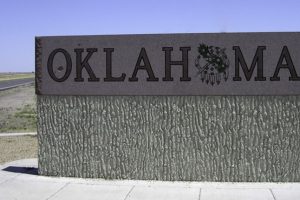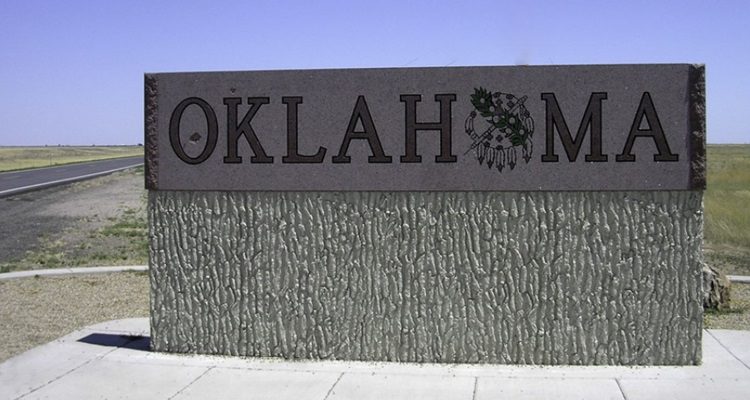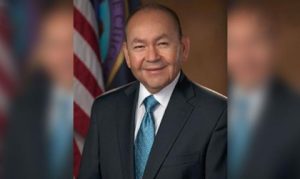After adding fuel to the fire of an already heated situation, Oklahoma Governor, Kevin Stitt, now faces a federal lawsuit filed by the state’s three largest gaming tribes in Oklahoma City federal court on Tuesday.
The Cherokee, Chickasaw and Choctaw nations are seeking a declaratory judgment that the tribe’s 15-year-old gaming compacts that give them exclusive rights to operate casinos in Oklahoma automatically renew on Wednesday, Jan 1st, 2020.
According to The Oklahoman, accompanying the filing of the lawsuit was a prepared statement in which Chickasaw Nation Governor Bill Anoatubby (pictured below), said…
“We have a solemn duty to protect the sovereign rights of our Tribal Nations as well as the interests of our citizens.
“While we prefer negotiation to litigation, the federal court is now the only reasonable alternative to bring legal certainty to this issue. We remain hopeful we will continue to have a productive and mutually beneficial relationship with the State of Oklahoma once we have resolved this issue.”
Letters exchanged:
The first-term governor rolled the dice on Friday, December 27, sending a letter to all gaming tribes advising them that the state intends to resume auditing their gaming operations Jan. 2. The state reportedly stopped conducting audits on casino’s “business activity between Jan. 1, 2018, and Dec. 31, 2018,” said a spokeswoman for Stitt, according to an earlier report.
In the December 27 letter, Stitt claims class-three gaming will be illegal after January 1, 2020, unless the compacts are either extended or renegotiated. The governor also advised that he doesn’t want the Oklahoma businesses that provide services for the casinos operating illegally.
Thirty-two tribal leaders responded with a joint letter accusing the governor of making inappropriate threats to the tribe’s casino vendors.
The exchange of letters followed the December 23 resignation of Stitt’s Secretary of Native American Affairs, Lisa Billy, who reportedly stated in her letter that the conflict created “real risk of lasting damage to the state-tribal relationship and to our economy.”
All about the Benjamins:
Oklahoma’s 28th governor has reportedly said that he is looking for the tribes to pay a much higher exclusivity rate than the 4 percent to 6 percent graduated rate that they have been paying on the Las Vegas-style Class III slots they operate. The tribes also pay rates as high as 10 percent on select table games, including craps and roulette.
The exclusivity fees that guarantee the state will not license co 7BALL mmercial casinos have generated $1.6 billion in taxes and revenue share payments and added $9.6 billion to the state’s economy, according to a November 2018 study cited by the American Gaming Association (AGA).
In fiscal year 2019 alone, the state of Oklahoma has received about $148 million in exclusivity fees from the tribes.
The Oklahoman further reports that Choctaw Nation Chief Gary Batton said…
“The governor’s stance on the gaming compact has created uncertainty and has been seen as a threat to our employees and our business partners. We see this legal action as the most viable option to restore the clarity and stability the tribes and Oklahoma both deserve by obtaining a resolution that our compact does automatically renew.”
Extension offered:
In a December 17 news conference, Stitt announced that in addition to taking over gambling negotiations he would also be offering tribes an extension that would allow casino gambling to continue after Jan. 1.
It now appears that two of the state’s tribes have taken the governor up on that offer, with the federally recognized Kialegee Tribal Town and the United Keetoowah Band of Cherokee Indians signing an eight-month extension on New Year’s Eve, to which Stitt responded…
“I appreciate the honesty and boldness of the Kialegee Tribal Town and the United Keetoowah Band of Cherokee Indians who recognize the Jan. 1, 2020 expiration in the Model Gaming Compact and have signed on to the eight-month extension generously offered by the State. These extensions will enable the parties to negotiate a compact that better accounts for the differing needs of tribes throughout the state and the State’s interests in preserving the substantial exclusivity without a cloud of legal uncertainty. The State of Oklahoma offered an extension, with no strings attached, to all tribes that operate casinos in the state, and my door continues to be open for more tribes to join who are worried about impending uncertainty,” as reported by KWTV-DT News 9.
Compact clarity:
Both sides of the dispute reportedly point to Part 15.B of the compact (State Question 712) signed in 2004 by then Governor Brad Henry, which states…
“This Compact shall have a term which will expire on January 1, 2020, and at that time, if organization licensees or others are authorized to conduct electronic gaming in any form other than pari-mutuel wagering on live horse racing pursuant to any governmental action of the state or court order following the effective date of this Compact, the Compact shall automatically renew for successive additional fifteen-year terms.”
While the compact does state that it will expire on January 1, 2020, the “shall automatically renew” clause appears to cause the compact to automatically renew for an additional 15 years. The tribes say the reason being is because in October 2019 the Oklahoma Horse Racing Commission approved all horse track gaming and racing license applications, which includes electronic gaming, for calendar year 2020.





